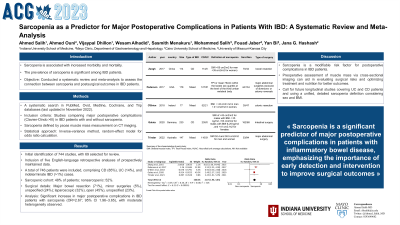Tuesday Poster Session
Category: IBD
P3617 - Sarcopenia as a Predictor for Major Postoperative Complications in Patients with IBD: A Systematic Review and Meta-Analysis
Tuesday, October 24, 2023
10:30 AM - 4:00 PM PT
Location: Exhibit Hall


Ahmed Salih, MD
Indiana University School of Medicine
Muncie, IN
Presenting Author(s)
Ahmed Salih, MD1, Ahmed Ouni, MD2, Vijaypal Dhillon, MD1, Wesam Alhadid, MD1, Amir Beirat, MD1, Sasmith Menakuru, MD1, Mohammed Salih, 3, Fouad Jaber, MD4, Yan Bi, MD, PhD2, Jana G.. Hashash, MD, MSc, FACG2
1Indiana University School of Medicine, Muncie, IN; 2Mayo Clinic, Jacksonville, FL; 3Cairo University School of Medicine, Cairo, Al Qahirah, Egypt; 4University of Missouri-Kansas City, Kansas City, MO
Introduction: Sarcopenia has been increasingly reported as a cause of morbidity and mortality. Additionally, sarcopenia is significantly prevalent among patients with inflammatory bowel disease (IBD). We conducted a systematic review and meta-analysis to assess the association between sarcopenia and postsurgical outcomes in patients with IBD.
Methods: We systematically searched PubMed, Ovid, Medline, Cochrane, and Trip databases, last updated November 2022. We also performed a manual search of the relevant articles’ references. We included studies comparing major postoperative complications ( >III Clavien-Dindo classification) in IBD patients with sarcopenia and those without. Sarcopenia was defined by measuring psoas muscle mass on CT imaging. Inverse-variance method was used to calculate the weighted pooled odds ratio under the random effect model.
Results: Initial search identified 744 studies, of which 69 relevant articles were selected and reviewed. Five studies met our inclusion criteria, characteristics of each study in table 1. All the studies included were published in English in full-text form, and were retrospective analyses of prospectively maintained data. A total of 746 were included in this meta-analysis. Of these patients, 639 patients had Crohn's disease (CD) (85%), 103 had ulcerative colitis (UC) (14%), and four patients had indeterminate IBD (< 1%). The sarcopenic cohort included 359 (48%) patients, while 387 (52%) patients were in the nonsarcopenic group.
Major bowel resection was performed in 71% (531), minor surgeries in 5% (37), and 24% of the surgeries (178) were not reported. While 32% (244) of them were laparoscopic, 45% (338) were open, and 23% (178) were not specified. The analysis showed a significant increase in the odds of major postsurgical complications in patients with IBD who had concomitant sarcopenia compared to those without sarcopenia (OR=2.67; 95% CI 1.96–3.65). Moderate heterogeneity was observed in the analyses (I²=52%, p=0.08) Figure 1.
Discussion: Sarcopenia is a major modifiable risk factor for postoperative complications in IBD patients. Preoperative assessment of muscle mass by cross-sectional imaging can help stratify the risks of surgery and facilitates adjustments to treatment and nutritional status to improve outcomes. Further longitudinal studies that recruit both UC and CD patients and use a unified detailed definition of sarcopenia that considers sex and BMI are needed.

Disclosures:
Ahmed Salih, MD1, Ahmed Ouni, MD2, Vijaypal Dhillon, MD1, Wesam Alhadid, MD1, Amir Beirat, MD1, Sasmith Menakuru, MD1, Mohammed Salih, 3, Fouad Jaber, MD4, Yan Bi, MD, PhD2, Jana G.. Hashash, MD, MSc, FACG2. P3617 - Sarcopenia as a Predictor for Major Postoperative Complications in Patients with IBD: A Systematic Review and Meta-Analysis, ACG 2023 Annual Scientific Meeting Abstracts. Vancouver, BC, Canada: American College of Gastroenterology.
1Indiana University School of Medicine, Muncie, IN; 2Mayo Clinic, Jacksonville, FL; 3Cairo University School of Medicine, Cairo, Al Qahirah, Egypt; 4University of Missouri-Kansas City, Kansas City, MO
Introduction: Sarcopenia has been increasingly reported as a cause of morbidity and mortality. Additionally, sarcopenia is significantly prevalent among patients with inflammatory bowel disease (IBD). We conducted a systematic review and meta-analysis to assess the association between sarcopenia and postsurgical outcomes in patients with IBD.
Methods: We systematically searched PubMed, Ovid, Medline, Cochrane, and Trip databases, last updated November 2022. We also performed a manual search of the relevant articles’ references. We included studies comparing major postoperative complications ( >III Clavien-Dindo classification) in IBD patients with sarcopenia and those without. Sarcopenia was defined by measuring psoas muscle mass on CT imaging. Inverse-variance method was used to calculate the weighted pooled odds ratio under the random effect model.
Results: Initial search identified 744 studies, of which 69 relevant articles were selected and reviewed. Five studies met our inclusion criteria, characteristics of each study in table 1. All the studies included were published in English in full-text form, and were retrospective analyses of prospectively maintained data. A total of 746 were included in this meta-analysis. Of these patients, 639 patients had Crohn's disease (CD) (85%), 103 had ulcerative colitis (UC) (14%), and four patients had indeterminate IBD (< 1%). The sarcopenic cohort included 359 (48%) patients, while 387 (52%) patients were in the nonsarcopenic group.
Major bowel resection was performed in 71% (531), minor surgeries in 5% (37), and 24% of the surgeries (178) were not reported. While 32% (244) of them were laparoscopic, 45% (338) were open, and 23% (178) were not specified. The analysis showed a significant increase in the odds of major postsurgical complications in patients with IBD who had concomitant sarcopenia compared to those without sarcopenia (OR=2.67; 95% CI 1.96–3.65). Moderate heterogeneity was observed in the analyses (I²=52%, p=0.08) Figure 1.
Discussion: Sarcopenia is a major modifiable risk factor for postoperative complications in IBD patients. Preoperative assessment of muscle mass by cross-sectional imaging can help stratify the risks of surgery and facilitates adjustments to treatment and nutritional status to improve outcomes. Further longitudinal studies that recruit both UC and CD patients and use a unified detailed definition of sarcopenia that considers sex and BMI are needed.

Figure: Forest Plot
Disclosures:
Ahmed Salih indicated no relevant financial relationships.
Ahmed Ouni indicated no relevant financial relationships.
Vijaypal Dhillon indicated no relevant financial relationships.
Wesam Alhadid indicated no relevant financial relationships.
Amir Beirat indicated no relevant financial relationships.
Sasmith Menakuru indicated no relevant financial relationships.
Mohammed Salih indicated no relevant financial relationships.
Fouad Jaber indicated no relevant financial relationships.
Yan Bi indicated no relevant financial relationships.
Jana Hashash: Iterative Health – Grant/Research Support.
Ahmed Salih, MD1, Ahmed Ouni, MD2, Vijaypal Dhillon, MD1, Wesam Alhadid, MD1, Amir Beirat, MD1, Sasmith Menakuru, MD1, Mohammed Salih, 3, Fouad Jaber, MD4, Yan Bi, MD, PhD2, Jana G.. Hashash, MD, MSc, FACG2. P3617 - Sarcopenia as a Predictor for Major Postoperative Complications in Patients with IBD: A Systematic Review and Meta-Analysis, ACG 2023 Annual Scientific Meeting Abstracts. Vancouver, BC, Canada: American College of Gastroenterology.
